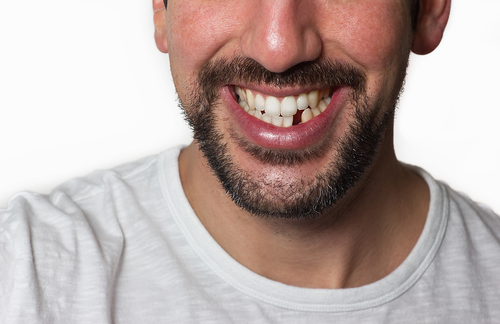Traditional removable dentures were once the standard solution for replacing a full row of missing and/or badly damaged teeth. Despite their ability to improve the appearance and function of a patient’s smile, this restorative option has numerous drawbacks that many individuals find bothersome on a daily basis—including a poor fit, the need for messy adhesives, slippage and irritation along the gumline, and more. Fortunately, patients now have a more comfortable and effective alternative to traditional dentures for full arch tooth replacement: implant dentures.
Explore Topics On This Page
What Are the Benefits of Permanent Implant-Supported Teeth?
Permanent full arch tooth replacement with implant-supported teeth can offer a number of benefits to people seeking an alternative to traditional removable dentures. These include:
- No need for bothersome adhesives and oral glues
- The prosthetic does not slip or move out of place when talking or chewing
- Improved stability and comfort
- The restoration does not need to be removed to clean
- A significant reduction in gum irritation
- Restored appearance and function of teeth
- An exceptionally natural look and feel
Visit our specialty site for more information about implant-supported dentures.
Did You Know?
A full arch implant is a specific technique for full arch tooth replacement. Other terminology you may hear or read about in reference to full arch tooth replacement includes:
- Implant Dentures
- Implant-Supported Dentures
- Implant-Anchored Dentures
- Implant Overdentures
- All-on-4®
- All-on-6
- Teeth in a Day
- Implant-Supported Teeth
- Permanent Implant-Supported Teeth
- Permanent Teeth
- Implant Teeth
What’s the Difference Between a Full Arch Implant and All-on-4®?
A full arch implant and All-on-4® implant systems are both designed to replace upper and lower rows of teeth, but the two techniques have a distinct difference—the number of implants and materials utilized. In most cases, six dental implants are placed to secure an “upper” full arch implant restoration, and five implants are used to anchor a “lower” full arch dental implant restoration. As its name suggests, All-on-4® uses only four dental implants per arch.
The greater number of dental implants placed for a full arch implant restoration is significant because it generally creates a more stable, long-term solution. In contrast, placing too few implants leads to a higher risk of the entire restoration failing, particularly for patients who have less optimal jawbone density. As a result, a full arch implant is often considered a better, more predictable option for a wider range of patients.
How Is a Full Arch Implant Different Than Other Full Arch Dental Restorations?
In today’s age of dentistry, there are many different types of full arch tooth replacement options available—though not all are created equal. Dr. Deb and Dr. Rob utilize a full arch implant due to the numerous advantages the technique offers over alternative methods. Some key differences between a full arch implant and other full arch dental restorations include:
- Candidacy: Many women and men who have been told they are not good candidates for implant-supported full arch tooth replacement are eligible for a full arch implant. This is because the full arch implant process uses bone that most individuals still possess despite bone loss, whereas more conventional methods require patients to have minimal to no bone deterioration at all—which is often not the case for people with missing teeth.
- Materials: A full arch implant is fabricated from an incredibly strong chrome cobalt material, and the prosthetic restoration is formed using cross-linked PMMA and pink acrylic material. The result is an exceptionally natural tooth and gum tissue appearance.
- Treatment Time: The total treatment time for implant-supported teeth will be influenced by several different factors, including whether tooth extraction and/or bone grafting is necessary, the location of the missing tooth or teeth, and if any oral infections are present initially. On average, the full arch implant process can normally be completed in less time than traditional implant denture methods—all without sacrificing safety, durability, or aesthetics.
For more information about what sets a full arch implant apart from other full arch dental restorations, please contact our office.
What Is the Implant-Supported Teeth Process Like?
A key benefit of receiving a full arch implant at Bethesda Sedation Dentistry is that all phases of care are completed right here in our office, meaning patients enjoy the convenience and efficiency of one location for treatment planning, implant surgery, and placement of the final restoration. In addition, our dentists offer award-winning sedation dentistry services that can help alleviate dental anxieties, maximize patient comfort, and shorten total treatment time.To begin the procedural process, Dr. Deb or Dr. Rob will conduct a thorough oral examination to assess your oral tissues and determine if an implant-supported set of teeth is right for you. If it is decided that you are a good candidate, your dentist will move forward with the planning of treatment by using digital imaging to map your mouth and a computer-generated surgical guide to determine the optimal position for your implants. In the event you are not eligible for full arch tooth replacement at this time, your dentist may suggest a technique such as bone grafting to strengthen jawbone density and improve your chances for candidacy, or they might recommend a more appropriate alternative.
The surgical aspects of treatment are completed in two separate stages, with the first being the extraction of any remaining upper and/or lower teeth. Following tooth extraction, you will have several follow-up visits at our practice to monitor healing, fine-tune planning and restoration specifications, and prepare for implant placement. The number of implants placed during the second surgical stage will depend on whether you need a full upper arch restoration, a full lower arch restoration, or both. For full upper arch tooth replacement, your dentist will carefully position six dental implants in strategic locations along the jawbone. Similarly, five implants will be meticulously placed along the lower jawbone for full lower arch tooth replacement. To aid with healing, each implant may be coated in L-PRF—a biocompatible substance of highly concentrated tissue regeneration elements found naturally in the blood. As these implants fuse to the bone (which may take several months), temporary restorations can be secured, enabling you to speak, eat, and smile normally throughout the healing process.
In the weeks following implant placement, you will return to our office several times so your dentist can check the status of your healing, take impressions for your final restoration, and make any finishing adjustments. When the implants have fully fused to the jawbone, they are officially a part of your mouth and are ready for the final, permanent restoration to be placed. Depending on your specific needs, an “upper” full arch implant prosthesis is used to replace the top row of teeth, and a “lower” full arch implant prosthesis is used to replace the bottom row of teeth. Both of these restorations also include a natural-appearing prosthetic gumline for an ideal look and feel.
On average, the entire full arch implant process takes approximately five to six months from initial planning to placement of the final upper and/or lower full arch restoration(s), though this can vary by individual. Once treatment is complete, the end result is a permanent, incredibly natural-looking and functioning row of upper and/or lower teeth.
How Much Do Implant-Supported Teeth Cost?
Full arch tooth restoration prices vary greatly, with some practices charging upwards of $50,000 per arch for the total cost of care. At Bethesda Sedation Dentistry, the cost of a full arch dental implant is $27,500 per arch, which commonly includes IV sedation, tooth extractions, and/or bone grafting—three services that often inflate pricing as supplementary expenses at other offices.
To help make implant-supported teeth as affordable as possible, we offer dental financing through CareCredit®, Proceed Finance, and PatientFi®. These trusted healthcare lending institutions provide a number of low- and no-interest monthly payment plans to align with virtually any budget. The simple application process and quick approval notification can allow you to move forward with treatment at your earliest convenience.
Contact Our Practice
To learn more about permanent, full arch tooth replacement with implant-supported teeth, or if you wish to schedule an appointment at our office, please contact Bethesda Sedation Dentistry today.







